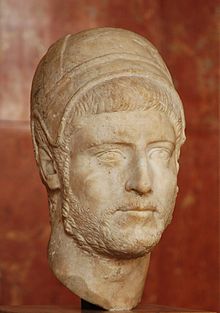
 |
Freethought & Rationalism ArchiveThe archives are read only. |
|
|||||||
|
|
Thread Tools | Search this Thread |
|
|
#21 |
|
Veteran Member
Join Date: Jan 2008
Location: Canada
Posts: 2,457
|
Sorry to detour from your scholastic discussion Toto, but I've often wondered if High Liner Fish Products ever considered suing over logo infringement? Please carry on. :blush:
|
|
|
|
|
#22 | ||||||
|
Veteran Member
Join Date: Nov 2007
Location: Chicago, IL
Posts: 3,058
|
Quote:
Quote:
Quote:
. Quote:
Quote:
Secondly, your source does not say, as you claimed it did here, that Constantine often referred to himself as "bishop of bishops"'s , let alone that the title does indeed have the twofold significance you claimed it had. So, once again, you've read into a "source" things that aren't there and misrepresented what it actually says. Third, none of the statements that your source makes are documented. Fourth, yours source's statements about the word episkopos and about Constantine that you use for your claims are at best dubious and at worst untrue. Take the claim that one of the meanings of Episkipos was "spy". While technically true, the claim is irrelevant and cannot be used to support the tentative inference that is drawn from it, since, as has been shown to you, "spy" was not part of the semantic range that episkopos had in Constantine's time. And then there's the claim that Constantine did in fact call himself "Bishop of Bishops"? I've searched the TLG and I have not found -- at least in literary texts -- any evidence that he ever did. So what substantiates the claim? Do you know? So no, it's not acceptable to justify the dual significance of episkopos in relation to the bishop of bishops Constantine, as a "spy of spies", since it does not even come close to doing what you claim it does. Jeffrey |
||||||
|
|
|
|
#23 | |
|
Contributor
Join Date: Mar 2006
Location: Falls Creek, Oz.
Posts: 11,192
|
Quote:
What are you attempting to say? That data in books designed for the instruction of grade 5-8 students is not to be relied upon? I would have thought the opposite should apply. Best wishes, Pete |
|
|
|
|
|
#24 |
|
Contributor
Join Date: Jun 2000
Location: Los Angeles area
Posts: 40,549
|
The editors and fact checkers (if any) for juvenile books are usually not specialists. Whenever scientists and academics review grade school textbooks, they are usually horrified at the amount of inaccuracy.
So that book should be regarded as unreliable. |
|
|
|
|
#25 | ||
|
Veteran Member
Join Date: Nov 2007
Location: Chicago, IL
Posts: 3,058
|
Quote:
Jeffrey |
||
|
|
|
|
#26 | |
|
Contributor
Join Date: Mar 2006
Location: Falls Creek, Oz.
Posts: 11,192
|
Quote:
I will regard the data as unreliable when it is shown to be incorrect by citation and refutation, not because you (or anyone else) "says so" on the basis that the book was designed for juvenile students. If you are able to show this data is inaccurate, please feel free to rip it to bits with the appropriate counter-citations. But until then, your pronouncements "against authors of books intended for juvenile students" are baseless in this instance. Best wishes, Pete |
|
|
|
|
|
#27 | |
|
Contributor
Join Date: Mar 2006
Location: Falls Creek, Oz.
Posts: 11,192
|
Quote:
You mean like the practice of "New Testament and Biblical Scholars" who swear by Eusebius' Golden Book of PreNicene Christian Histories? Best wishes, Pete |
|
|
|
|
|
#28 | |
|
Contributor
Join Date: Mar 2006
Location: Falls Creek, Oz.
Posts: 11,192
|
Quote:
There are a great deal of people who appear to have written books which make reference to Constantine considering himself as "Bishop of Bishops". Start with Schaff, or perhaps The Cambridge History of Medieval Political Thought C. 350-c. 1450 By James Henderson Burns. We could start with the Constantine's legal role as "Pontifex Maximus", and over and above the flamen - priests assigned to a state-supported god or goddess in Roman religion. Was Constantine the flamen of flamen?  Best wishes, Pete |
|
|
|
|
|
#29 | ||
|
Contributor
Join Date: Mar 2006
Location: Falls Creek, Oz.
Posts: 11,192
|
Quote:
You do understand that Jesus was in fact the captain of a sailing boat, crewed by two angels, who transported the apostles Andrew and Matthias to the land of the Cannibals? See the Acts of Andrew and Matthias (Matthew) - From "The Apocryphal New Testament", M.R. James-Translation and Notes, Oxford: Clarendon Press, 1924 Quote:
Best wishes, Pete |
||
|
|
|
|
#30 | ||
|
Veteran Member
Join Date: Nov 2007
Location: Chicago, IL
Posts: 3,058
|
Quote:
Jeffrey |
||
|
|
| Thread Tools | Search this Thread |
|